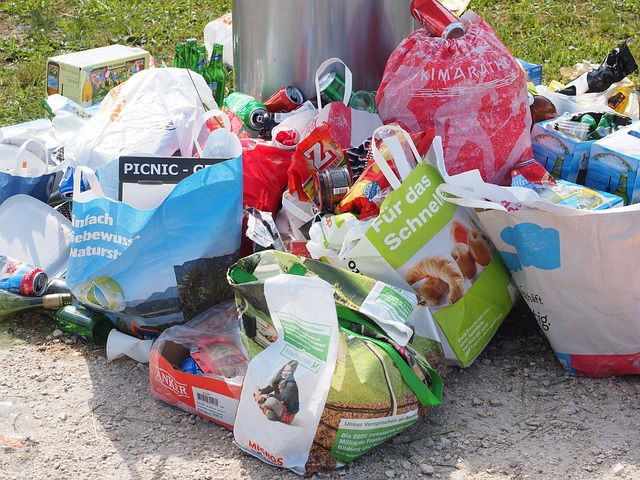
Commercial waste refers to any waste generated by businesses, industries, and other commercial activities. This waste can include everything from office paper to hazardous materials, and it poses significant challenges for waste management in Australia. Orange Bins offers reliable, responsible and professional commercial waste management services to businesses from various industries.
Let’s understand what commercial waste is, its impacts on the environment, and how businesses can manage it in a sustainable manner.
What is Commercial Waste?
Commercial waste in Australia refers to any waste generated by businesses, industries, and other commercial activities. It can include a wide range of materials such as paper, cardboard, plastics, glass, metal, food waste, hazardous waste, and electronic waste.
Commercial waste is a major contributor to the overall waste generated in Australia, with an estimated 20% of waste coming from businesses. It is generated by a variety of industries, including retail, manufacturing, construction, and hospitality.
Businesses that generate commercial waste are responsible for managing it in a safe and environmentally responsible manner. This includes separating the waste into different categories and ensuring that hazardous waste is disposed of safely and appropriately.
Impacts of Commercial Waste
Commercial waste has several negative impacts on the environment. When waste is not managed correctly, it can pollute the air, water, and soil, harming both wildlife and ecosystems. For example, when hazardous waste is not disposed of properly, it can release toxic chemicals into the environment, which can contaminate the soil and groundwater. Similarly, when electronic waste is not recycled, it can release harmful chemicals into the air and contribute to climate change.
In addition to environmental impacts, commercial waste can also have economic impacts. When waste is not managed efficiently, it can result in increased costs for businesses, including disposal fees and fines for non-compliance with regulations. It can also impact a business’s reputation, as consumers are increasingly aware of the importance of sustainability and may be more likely to support companies that prioritize sustainable waste management.
How to Manage Commercial Waste
Managing commercial waste is critical for both the environment and the business’s bottom line. Here are some strategies businesses can use to manage their waste sustainably:
Conduct a Waste Audit
The first step in managing commercial waste is to conduct a waste audit. This involves assessing the types and quantities of waste generated by the business and identifying opportunities to reduce, reuse, and recycle. A waste audit can help businesses identify where waste is coming from and find ways to reduce the amount of waste generated in the first place.
Implement The Reduce, Reuse, And Recycle Strategy
Once a waste audit has been conducted, businesses can implement the reduce, reuse, and recycle startegy. By reducing the amount of waste generated in the first place, businesses can limit the amount of waste that needs to be managed. Reusing items, such as packaging and containers, can also help reduce waste. Finally, recycling materials can divert waste from landfill sites and conserve energy.
Use a Waste Management Service
Using a waste management service is an excellent way for businesses to manage their waste sustainably. These services can help businesses identify opportunities to reduce waste and develop a comprehensive waste management plan. They can also provide collection and disposal services for various types of waste, including hazardous materials and electronic waste with skip bins in Hornsby.
Invest in Technology
Investing in technology can also help businesses manage their waste sustainably. For example, implementing a paperless office can reduce the amount of paper waste generated by the business. Similarly, using energy-efficient appliances and equipment can help reduce energy consumption, which can reduce the amount of waste generated.
Train Employees
Training employees on sustainable waste management practices can also help businesses manage their waste sustainably. Employees can be trained to identify opportunities to reduce waste, such as turning off lights and electronics when not in use. They can also be trained on how to properly dispose of waste, including hazardous materials and electronic waste and opt for skip bins Hornsby.
Compost Organic Waste
Composting organic waste is another way businesses can manage their waste sustainably. Composting can divert organic waste from landfill sites and create a valuable resource for gardens and agriculture. Businesses can set up a composting system on-site or partner with a waste management service that offers skip bins Hornsby and composting services.
Work With A Professional Waste Management Company
Commercial waste is a significant issue in Australia, and it is important for businesses to manage it sustainably to minimize its environmental and economic impacts. You should work with a company that provides collection and transport through skip bins Hornsby, and disposal of various types of waste, including green, electronic and hazardous waste.
Check if they offer waste audits and waste management plans to help businesses identify opportunities to reduce waste and improve their sustainability practices.
We offer a wide range of commercial waste management solutions. For any information on details about how we can help with your requirements with our skip bins Hornsby, please call Orange Bins at 1300 767 006 or email us through this Online Form and we will contact you soon to discuss your requirements.
